八年级上册英语unit3教案(共4课时)
- 格式:doc
- 大小:122.00 KB
- 文档页数:9

八年级英语Unit3教学案设计第1课时Section A1a--2d【学习目标】:知识与技能:1.能根据发音规则正确读写本课6个单词及2个短语。
2.能运用was/ were doing描述过去发生的事情。
过程与方法:采用三环节教学法,通过Pairwork, Reading,listening等开展学习活动.情感态度价值观:通过学习,能形成较好的人际交往能力。
【学习重点】:能听懂听力并用was/ were doing描述过去发生的事情。
【学习难点】:系词的运用及现在分词的变换形式。
【学习过程】:一、课前预习(教师寄语: No pains, no gains)认知前提:用所给词的适当形式填空1. Look, Tom ________________________(play) soccer.2. Mary___________________(write) a letter to her mother yesterday.3. My sister___________________(visit) Shanghai next week.4. Linda usually_________________(go)to school by bike.新知认知:Task1.背诵单词及短语,根据汉语意思进行默写单词:暴风雨___________ 闹钟___________ 开始___________(过去式)__________大量的______________ 突然_______________ 奇特的____________________短语:(闹钟)发出响声_______________ 接电话__________________Task 2. 预习课本1a--2a的内容,找出下列短语。
在街道上______________ 在公共汽车站______________ 等公共汽车______________走着回家_____________ 洗了一个热水澡________________ 开始下大雨_____________ Task 3. 预习课本,翻译下列句子。
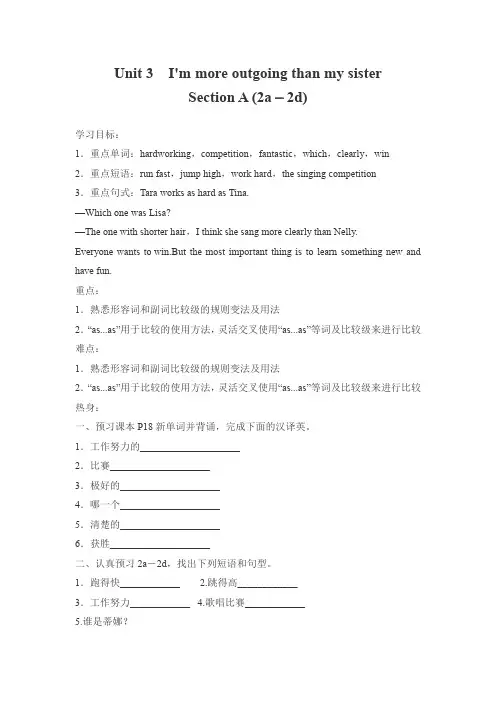
Unit 3I'm more outgoing than my sisterSection A (2a-2d)学习目标:1.重点单词:hardworking,competition,fantastic,which,clearly,win2.重点短语:run fast,jump high,work hard,the singing competition3.重点句式:Tara works as hard as Tina.—Which one was Lisa?—The one with shorter hair,I think she sang more clearly than Nelly.Everyone wants to win.But the most important thing is to learn something new and have fun.重点:1.熟悉形容词和副词比较级的规则变法及用法2.“as...as”用于比较的使用方法,灵活交叉使用“as...as”等词及比较级来进行比较难点:1.熟悉形容词和副词比较级的规则变法及用法2.“as...as”用于比较的使用方法,灵活交叉使用“as...as”等词及比较级来进行比较热身:一、预习课本P18新单词并背诵,完成下面的汉译英。
1.工作努力的____________________2.比赛____________________3.极好的____________________4.哪一个____________________5.清楚的____________________6.获胜____________________二、认真预习2a-2d,找出下列短语和句型。
1.跑得快____________ 2.跳得高____________3.工作努力____________ 4.歌唱比赛____________5.谁是蒂娜?_____________________________________________________________________ 6.—哪个是丽莎?—头发更短的那个。
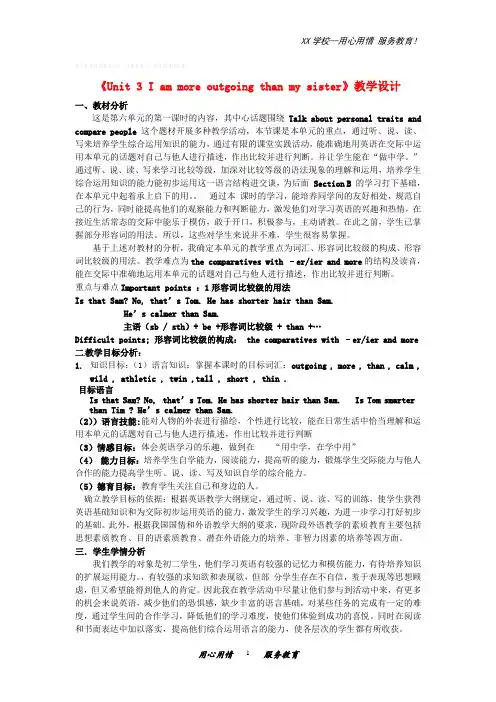
精品基础教育教学资料,请参考使用,祝你取得好成绩!《Unit 3 I am more outgoing than my sister》教学设计一、教材分析这是第六单元的第一课时的内容,其中心话题围绕Talk about personal traits and compare people这个题材开展多种教学活动,本节课是本单元的重点,通过听、说、读、写来培养学生综合运用知识的能力,通过有限的课堂实践活动,能准确地用英语在交际中运用本单元的话题对自己与他人进行描述,作出比较并进行判断。
并让学生能在“做中学。
”通过听、说、读、写来学习比较等级,加深对比较等级的语法现象的理解和运用,培养学生综合运用知识的能力能初步运用这一语言结构进交谈,为后面 Section B的学习打下基础,在本单元中起着承上启下的用。
通过本课时的学习,能培养同学间的友好相处,规范自己的行为,同时能提高他们的观察能力和判断能力,激发他们对学习英语的兴趣和热情,在接近生活常态的交际中能乐于模仿,敢于开口,积极参与,主动请教。
在此之前,学生已掌握部分形容词的用法。
所以,这些对学生来说并不难,学生很容易掌握。
基于上述对教材的分析,我确定本单元的教学重点为词汇、形容词比较级的构成、形容词比较级的用法。
教学难点为the comparatives with –er/ier and more的结构及读音,能在交际中准确地运用本单元的话题对自己与他人进行描述,作出比较并进行判断。
重点与难点Important points :1形容词比较级的用法Is that Sam? No, that’s Tom. He has shorter hair than Sam.He’s calmer than Sam.主语(sb / sth)+ be +形容词比较级 + than +…Difficult points; 形容词比较级的构成: the comparatives with –er/ier and more 二教学目标分析:1.知识目标:(1)语言知识:掌握本课时的目标词汇:outgoing , more , than , calm ,wild , athletic , twin ,tall , short , thin .目标语言Is that Sam? No, that’s Tom. He has shorter hair than Sam. Is Tom smarter than Tim ? He’s calmer than Sam.(2))语言技能:能对人物的外表进行描绘,个性进行比较,能在日常生活中恰当理解和运用本单元的话题对自己与他人进行描述,作出比较并进行判断(3)情感目标:体会英语学习的乐趣,做到在“用中学,在学中用”(4)能力目标:培养学生自学能力,阅读能力,提高听的能力,锻炼学生交际能力与他人合作的能力提高学生听、说、读、写及知识自学的综合能力。
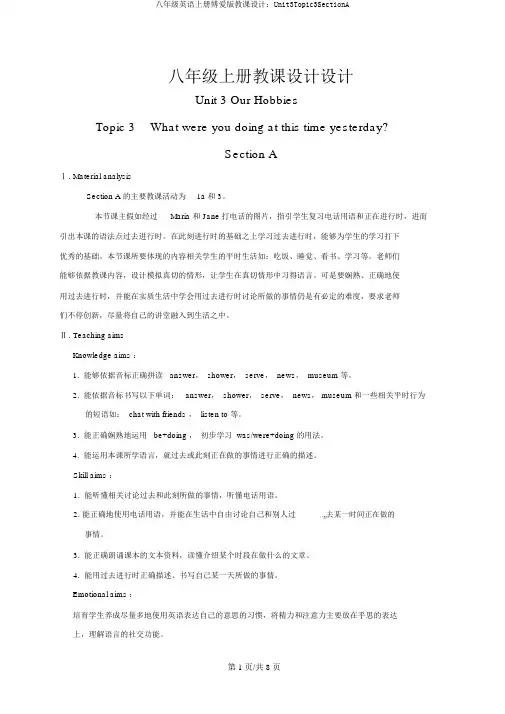
八年级上册教课设计设计Unit 3 Our HobbiesTopic 3 What were you doing at this time yesterday?Section AⅠ. Material analysisSection A 的主要教课活动为1a 和 3。
本节课主假如经过Maria 和 Jane打电话的图片,指引学生复习电话用语和正在进行时,进而引出本课的语法点过去进行时。
在此刻进行时的基础之上学习过去进行时,能够为学生的学习打下优秀的基础。
本节课所要体现的内容相关学生的平时生活如:吃饭、睡觉、看书、学习等。
老师们能够依据教课内容,设计模拟真切的情形,让学生在真切情形中习得语言。
可是要娴熟、正确地使用过去进行时,并能在实质生活中学会用过去进行时讨论所做的事情仍是有必定的难度,要求老师们不停创新,尽量将自己的讲堂融入到生活之中。
Ⅱ. Teaching aimsKnowledge aims :1.能够依据音标正确拼读 answer, shower, serve, news, museum 等。
2.能依据音标书写以下单词: answer, shower, serve, news, museum 和一些相关平时行为的短语如: chat with friends , listen to 等。
3.能正确娴熟地运用 be+doing ,初步学习 was/were+doing 的用法。
4.能运用本课所学语言,就过去或此刻正在做的事情进行正确的描述。
Skill aims :1.能听懂相关讨论过去和此刻所做的事情,听懂电话用语。
2. 能正确地使用电话用语,并能在生活中自由讨论自己和别人过去某一时间正在做的事情。
3.能正确朗诵课本的文本资料,读懂介绍某个时段在做什么的文章。
4.能用过去进行时正确描述、书写自己某一天所做的事情。
Emotional aims :培育学生养成尽量多地使用英语表达自己的意思的习惯,将精力和注意力主要放在乎思的表达上,理解语言的社交功能。
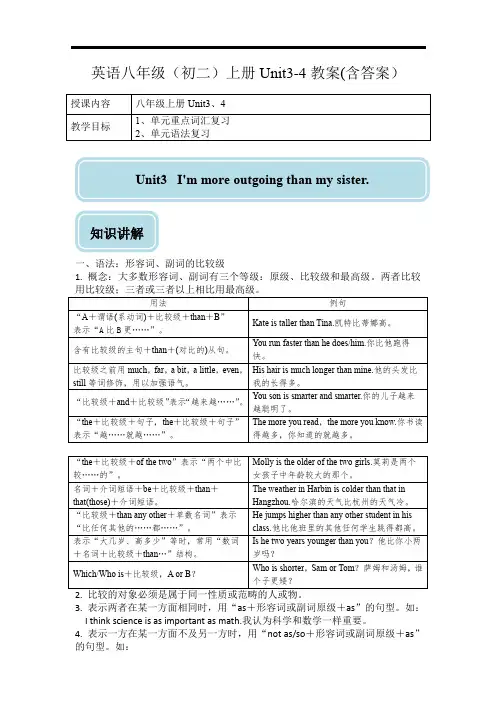
英语八年级(初二)上册Unit3-4教案(含答案)Unit3 I'm more outgoing than my sister.知识讲解一、语法:形容词、副词的比较级1. 概念:大多数形容词、副词有三个等级:原级、比较级和最高级。
两者比较3. 表示两者在某一方面相同时,用“as+形容词或副词原级+as”的句型。
如:I think science is as important as math.我认为科学和数学一样重要。
4. 表示一方在某一方面不及另一方时,用“not as/so+形容词或副词原级+as”的句型。
如:It is not as/so warm today as yesterday.今天不如昨天暖和。
二、辨析1. be like“就像…”I am like your sister.look like “外貌上的像”I look like my sister.2.both…and…两者都,后面的动词用复数形式Both Tom and Jim are students.3.help sb. to (do) sth. 帮助某人做某事= help sb. with sth. 在某方面帮助某人He often helps me (to)learn English. 他经常帮助我学习英语。
= He often helps me with my English. 他经常在英语方面帮助我。
4. That’s why+句子:那就是…的原因/那就是为什么…That's why I study English hard. 那就是我努力学习英语的原因。
三、短语1. more outgoing 更外向/更开朗2 make friends with sb. 与某人交朋友3. the singing competition 歌咏比赛4. the most important 最重要的5. be talented in music 在音乐方面有天赋6. the same as 与……相同be similar to 与…相似7. care about 关心/留意/关注8. be different from 与…...不同9. be like a mirror 像一面镜子10. as long as 只要;与…...一样长11. bring out 显示/显出12. have fun=Have a good time 玩得开心have fun doing sth 做某事很开心13. reach for 伸手达到/达到14. touch one’s heart 感动15. in fact 事实上16. the other 另一个17. be good with 与…和睦相处同步练习一、根据句意及汉语提示填写单词。
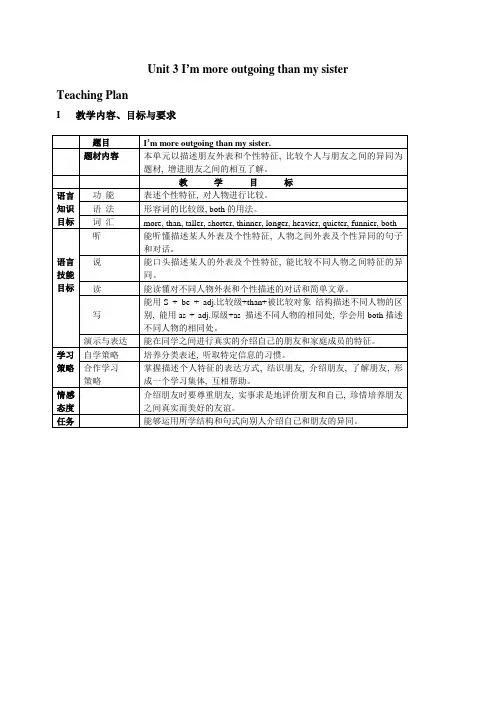
Unit 3 I’m more outgoing than my sister Teaching PlanI 教学内容、目标与要求II 教学内容分析本单元以描述某人的个性特征为中心而展开, 从外表和性格两方面比较人物之间的相同与不同点, 由此引出taller, shorter, thinner, longer, heavier, calmer, wilder, quieter, funnier, more athletic, more popular, more serious, more outgoing 等词汇, 以及“S + be + adj.比较级+than+被比较对象”这个重要的句子结构。
Section A部分重在要求听说读三个方面比较不同双胞胎之间外表和性格的区别, 附带着在3a也提出了as….as 结构the same as结构表达两人的相同之处。
与Section A部分比较, Section B 部分则深入到比较自己和朋友的相同与不同之处, 并提出了“选择朋友”这个话题, 引导学生正确评价朋友, 引导学生结识真正的好朋友。
III 教学过程建议围绕本单元“描述个性特征”这一话题,教师可以在课堂上展开系列的两人一组活动引出本单元的主要单词和句子结构“S + be + adj.比较级+than+被比较对象”。
如任务一:你眼里的我?学生两人一组展开活动,分别在各自的卡片上写下一些形容词,描述对方的身体和性格特点。
任务二:咱们相同吗?学生两人一组展开活动,通过比较各自的卡片,找出自己和对方相同的地方,简单地表述这些相同之处,然后进一步比较这些相同之处,说说它们在程度上的区别。
也可以准备一些教师自己或学生不同时期的照片,先用所学过的形容词描述照片,然后把两类照片进行比较,从而引出本单元所要讲的形容词的比较级。
本单元的听力练习教师可以根据学生的实际情况适当的扩展增加或降低难度。
在“说”方面,教师应尽量选择学生感兴趣的话题,激发学生开口交流。
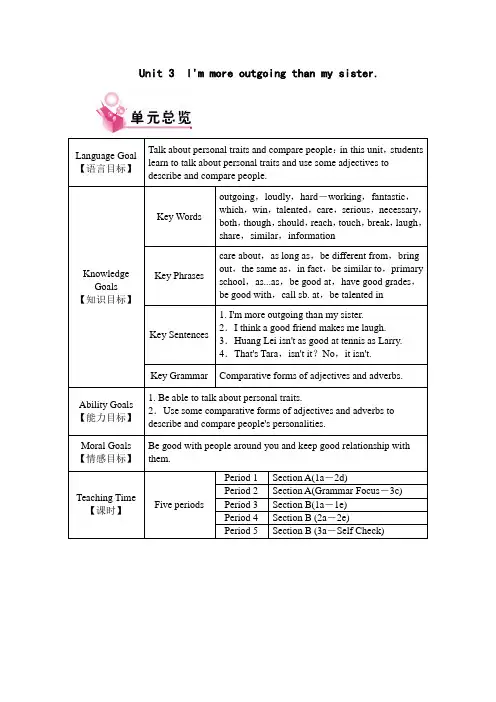
Unit 3 I'm more outgoing than my sister.Section A是基本的语言部分,打好本单元目标语言的基础。
运用听力(1b,2a,2b)、pair-work(1c,2c)、role-play (2d)等口语练习活动,层层递进,步步深入,充分培养学生学习目标英语的语感。
目标语言(语法和词汇)是在每个单元的开始通过图片和对话框呈现的。
图片将帮助学生建立一个自然的语境,让学生清晰地理解新的语言目标,熟悉这些语言在日常生活中是怎样使用的。
Section B是比较级的拓展和综合的语言运用。
1a,1b通过讨论在朋友身上什么是最重要的,为后面提供基本句子如makes me laugh等。
1c,1d通过听力继续以朋友为话题以比较级为语法谈论朋友。
2b,3c是通过阅读和写作最后达到综合运用语言的目的,2b培养真实生活中的语言阅读技能。
4通过谈论谁是合适的student helper来继续巩固运用目标语言。
Self Check 2考查五个形容词的用法及区别形容词比较级与原级的使用。
Self Check 3运用比较级对比自己和好友。
第一课时Section A(1a-2d)Teaching Goals【教学目标】Key words:outgoing,better,loudly,quietly,hard-working,competition,fantastic,which,clearly,winKey phrases:play the drums,more...than,as...as,singing competition,have fun Key sentences:1. I'm more outgoing than my sister.2. That's Tara,isn't it?No,it isn't.3. I think she sang more clearly than Nelly.Teaching Key Points【教学重点】The vocabulary:outgoing,better,loudly,quietly,hard-working,competition,fantastic,which,clearly,win,more...than,as...asTarget language:—Is that Sam?—No,that's Tom. Sam has longer hair than Tom.—That's Tara,isn't it?—No,it isn't. It's Tina. Tina is taller than Tara. And she also sings more loudly than Tara.—Did you like the singing competition yesterday,Anna?—Oh,it was fantastic!Nelly sang so well!Is Tom smarter than Sam?Teaching Difficult Points【教学难点】Oral practice using the target language above.Teaching Aids【教学工具】An English textbook,a tape recorder,CAI or courseware.Teaching Steps【教学过程】★Step 1Leading inAsk a student to introduce herself/himself.★Step 2Pre-taskPage 17,1a.1.Show some pictures to Ss.Say,They are stars. Ask Ss to tell what they see.Ask Ss to use the words:tall,loudly,thin,long hair,short hair,heavy,quietly,short and so on.2.Then ask Ss to repeat these sentences:Yao Ming is taller than Ronaldo.★Step 3While-taskPage 17,1c & 1b.1.Call attention to the picture.2.Point out the sample conversation in Activity 1c.Say,Now work with a partner. Make your own conversation about the twins.3.Ask several pairs to say one or more of their conversations.4.Then listen to the recording. Ask Ss to number the twins.5.Check the answers.Page 18,2a.1.Point out the two columns and read the headings:-er,-ier and more. Then point out the words in the box. Read.Say,Now listen and write the“-er”and“-ier”words in the first column and the words that use “more” in the second column.2.Play the recording and check the answers.Page 18,2b.1.Point out the picture and the two boxes with the headings Tina and Tara.Say,Listen to the recording. Write sentences in the boxes.2.Play the recording and check the answers.★Step 4Post-taskPage 18,2c & 2d.1.Point out the chart in Activity 2c and on Page 81.Say,Make your own conversations according to the information. Ask pairs to continue on their own.2.Correct the answers.3.Make students scan the conversation in 2d.4.Teach and then make Ss role-play the conversation in pairs. In this part,student A will be Julie. Student B will be Anna. As they talk,move around to monitor their work. Offer language or pronunciation support as needed.5.Have a group of students present their conversation to the class.★Step 5Homework1.How are you and your sister/brother different?Write down.2.Do the exercises on Page 15 in students' book.Board Design板书设计Unit 3I'm more outgoing than my sister.The first period Section A(1a-2d)1.Words:outgoing,better,loudly,quietly,hard-working,competition,fantastic,which,win,clearly2.Target language:①A:That's Tara,isn't it?B:No,it isn't.②A:Is Tom smarter than Sam?B:No,he isn't. Sam is smarter than Tom.第二课时Section A(GF-3c)Teaching Goals【教学目标】Key sentences:1.Is Tara more outgoing than Tina?No,she isn't. Tina is more outgoing than Tara.2.Does Tara work as hard as Tina?Yes,she does.3.Who is smarter,your mother or your father?I think my mother is smarter than my father.Teaching Key Points【教学重点】1.Grammar Focus. The sentences in the box.2.The comparative forms of adjectives and adverbs.Teaching Difficult Points【教学难点】1.The comparative forms of adjectives and adverbs.2.Use some adjectives to describe people and use their comparative forms to compare people.Teaching Aids【教学工具】An English textbook,CAI or courseware.Teaching Steps【教学过程】★Step 1Leading inAsk,How are you and your mother/father different?Ask some Ss to answer.★Step 2Pre-taskPage 19,Grammar Focus.1.Review the grammar box. Ask Ss to read the sentences to the class.2.Write the phrases “more outgoing than”.Say,When you compare things using words with three or more syllables,you use the word “more”.3.Call attention to the word “friendly”,circle “y” and say,When a word ends in “y”,change “y” to an “i”and add“-er”.4.Practice reading the sentences in the chart.★Step 3While-taskPage 19,3a & 3b.1.Call students' attention to 3a.2.Make students complete the tasks individually.3.Choose Ss to give their answers.4.Correct the answers.5.Practice reading.6.Turn to 3b.And choose a student to answer the five questions according to the example.★Step 4Post-taskPage 19,3c.1.Ask students to read the sample conversation in the box.2.Have students work in pairs to complete the chart.3.Ask some pairs to present their dialogues.★Step 5Homework1.Compare one of your best friends with you. Write down the same and different things between you two.2.Do the exercises on Page 16 in students' book.Board Design板书设计Unit 3I'm more outgoing than my sister.The second period Section A(GF-3c)1.Target language:①A:Is Tara more outgoing than Tina?B:No,she isn't. Tina is more outgoing than Tara.②A:Are you as friendly as your sister?B:No,I'm not. I'm friendlier.③A:Does Tara work as hard as Tina?B:Yes,she does.④A:Who is smarter,your mother or your father?B:I think my mother is smarter than my father.2.Answers to 3a.第三课时Section B(1a-1e)Teaching Goals【教学目标】Key words & phrases:talented,truly,care,be talented in,the same as,be good at,care about,make sb. laughKey sentences:1.I think a good friend makes me laugh.2.Molly studies harder than her best friend.Teaching Key Points【教学重点】The vocabulary:talented,care,care about,be talented inTarget language:I think a good friend makes me laugh.For me,a good friend likes to do the same things as me.Yes,and a good friend is talented in music,too.That's not very important for me...Molly studies harder than her best friend.Well,Mary and her best friend are both tall.Teaching Difficult Points【教学难点】Use the target language to talk with your classmates about your opinions on what makes a good friend.Teaching Aids【教学工具】An English textbook,a tape recorder,CAI or courseware.Teaching Steps【教学过程】★Step 1Leading in1.Show a maxim to Ss:A friend in need is a friend indeed.2.Ask,What kinds of things are important in a friend?★Step 2Pre-taskPage 20,1a.1.Read each description to the class and ask the Ss to repeat.2.What kinds of things are important in a friend?Rank the things below 1—7(1 is the most important).3.Ask different Ss to copy the seven phrases on the board. Then read the phrases together.★Step 3While-taskPage 20,1b.1.Say,Now make your own statements about friends using the phrases in Activity 1a.2.Ask some Ss to tell the class what they look for in a friend. And say,Who is your best friend?Page 20,1c.Play the recording and check the answers.Page 20,1d.Play the recording and check the answers.★Step 4Post-taskPage 20,1e.1.Say,Now work with your partner. Make a conversation using information in the chart.2.Ask several pairs to say their conversations to the class.★Step 5HomeworkDo the exercises on Page 17 in students' book.Board Design板书设计Unit 3I'm more outgoing than my sister.The third period Section B(1a-1e)1.Key vocabulary:truly,be talented in,the same as,be good at,care about,make sb. laugh2.Target language:A:Molly studies harder than her best friend.B:Well,Mary and her best friend are both tall.第四课时Section B(2a-2e)Teaching Goals【教学目标】Key words:serious,mirror,kid,necessary,both,though,grade,should,saying,reach,hand,touch,heart,fact,break,arm,laugh,share,loud,similar Key phrases:as long as,be different from,bring out,the same as,care about,in fact,be similar toKey sentences:1. I'm quieter and more serious than most kids.2.I don't really care if my friends are the same as me or different.3.Huang Lei isn't as good at tennis as Larry.4.A true friend reaches for your hand and touches your heart.Teaching Key Points【教学重点】The vocabulary:serious,necessary,both,though,should,reach,touch,break,laugh,share,loud,similar,as long as,be different from,the same as,in fact,be similar toTarget language:I'm quieter and more serious than most kids. That's why I like reading books and study harder in class.In fact,she's funnier than anyone I know.I know she cares about me because she's always there to listen.Teaching Difficult Points【教学难点】Talk about the famous sayings about friends.Teaching Aids【教学工具】An English textbook,CAI or courseware.Teaching Steps【教学过程】★Step 1Leading in1.Greetings.2.Ask,Should friends be the same or different?Choose 2 or 3 students to talk about their opinions. Say,Today we'll read about what these people think.★Step 2Pre-taskPage 21,2a & 2b.1.Project some famous sayings about friendship on the screen. Ask Ss to guess their meanings and think of more.2.Project these new words on the screen or write them on the board and teach the new words. Ask students to repeat them. And make sure everyoneknows the meanings.serious adj.严肃的;mirror n.镜子;necessary adj.必需的;both adj. & pron.两个;though adv.不过,可是 conj.虽然;should modal v.应该;reach v.到达;touch v.感动,触摸;fact n.事实;break v.(使)破;laugh v.笑;share v.分享;similar adj.类似的;as long as只要;be different from 与……不同;bring out 使显现;the same as和……相同;in fact事实上;be similar to与……相像的3.Make students scan the three articles first. Ask students to put a mark in contents that are unfamiliar to them. Then the teacher lead Ss to learn them. Pay attention to the new words and phrases on the screen.4.Practice reading.★Step 3While-taskPage 22,2c & 2d.1.Make students read 2b again. Then judge if the eight statements in 2c are true(T)or false(F).2.Choose students to give their answers.3.Check the answers.4.Ask,How do you and your friends compare with the people in the article?Choose a student to talk about it with five sentences.★Step 4Post-taskPage 22,2e.1.Read the four sayings about friends.2.Talk about these questions with your partner:Which saying about friends is your favorite?Which friend do you think about when you read this saying?Why?Begin your statements according to the example:My favorite saying is...It makes me think about my best friend. She/He is...★Step 5Homework1.Search for five famous sayings about friends. Write them in your exercise books.2.Do the exercises on Page 18 in students' book.Board Design板书设计Unit 3I'm more outgoing than my sister.The fourth period Section B(2a-2e)1.Words:serious,mirror,necessary,both,grade,should,saying,reach,hand,touch,fact,break,laugh,share,loud,similar 2.Phrases:as long as,be different from,bring out,the same as,care about,in fact,be similar to3.Sentences:①I'm quieter and more serious than most kids.②Huang Lei isn't as good at tennis as Larry.③Friends are like books-you don't need a lot of them as long as they're good.④A true friend reaches for your hand and touches your heart.第五课时Section B(3a-Self Check)Teaching Goals【教学目标】Key words & phrases:primary,information,primary school,be good with,call sb. at,have good gradesKey sentences:1.The English Study Center needs a weekend student helper for primary school students.2.Call the English Study Center at 443-5667 for more information.3.So who do you think should get the job,Jenny or Jill?Teaching Key Points【教学重点】The vocabulary:information,primary school,have good grades,be good with,call sb. at...Teaching Difficult Points【教学难点】Writing practice.Teaching Aids【教学工具】An English textbook,CAI or courseware.Teaching Steps【教学过程】★Step 1Leading in1.Greetings.2.Check the homework.★Step 2Pre-taskPage 23,3a.1.Look at the pictures and the information in the chart.2.Compare Wang Lingling with Liu Lili. Write down the results.3.Choose a student to present his or her answers.★Step 3While-taskPage 23,3b & 3c.1.Complete the task in 3b.2.Write two paragraphs describing your friends using the notes you make in 3b.3.Choose 2 or 3 students to read their competitions loudly.4.Correct the mistakes.★Step 4Post-taskPage 24,Part 4.1.Write the names of two outgoing students on the board. Say,Who do you think should get the job,A or B?2.Ask Ss to work in pairs.3.Ask some pairs who they think should get the job and why.★Step 5ExercisePage 24,Self Check.1.Ask students to work on their own.2.Check the answers.★Step 6Homework1.Compare two of your best friends. Write five sentences using comparatives.2.Do the exercises on Page 19 in students' book.Board Design板书设计Unit 3I'm more outgoing than my sister.The fifth period Section B(3a-Self Check) 1.Key vocabulary:information,primary school,be good with,call sb. at+电话号码,have good grades2.Sentences:①Call the English Study Center at 443-5667 for more information.②Jenny is smarter,but I think Jill is more outgoing.。
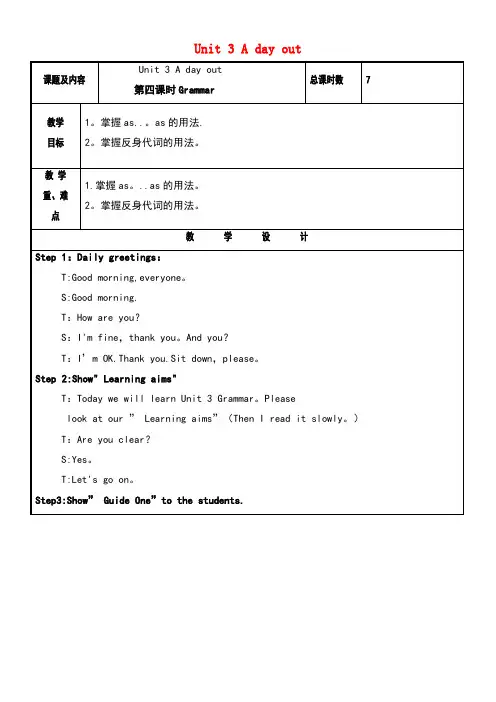
Unit 3 A day out
尊敬的读者:
本文由我和我的同事在百忙中收集整编出来,本文档在发布之前我们对内容进行仔细校对,但是难免会有不尽如人意之处,如有疏漏之处请指正,希望本文能为您解开疑惑,引发思考。
文中部分文字受到网友的关怀和支持,在此表示感谢!在往后的日子希望与大家共同进步,成长。
This article is collected and compiled by my colleagues and I in our busy schedule. We proofread the content carefully before the release of this article, but it is inevitable that there will be some
unsatisfactory points. If there are omissions, please correct them. I hope this article can solve your doubts and arouse your thinking. Part of the text by the user's care and support, thank you here! I hope to make progress and grow with you in the future.。
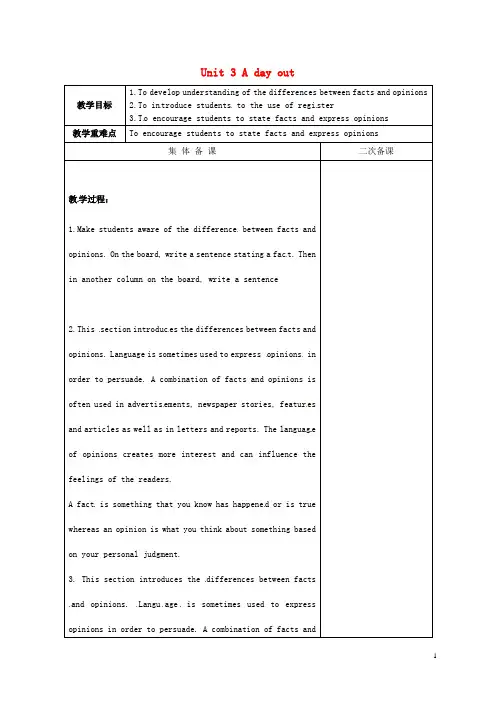
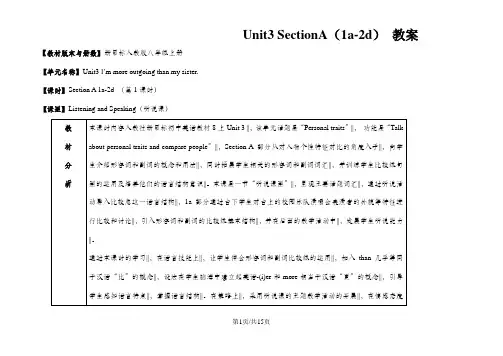
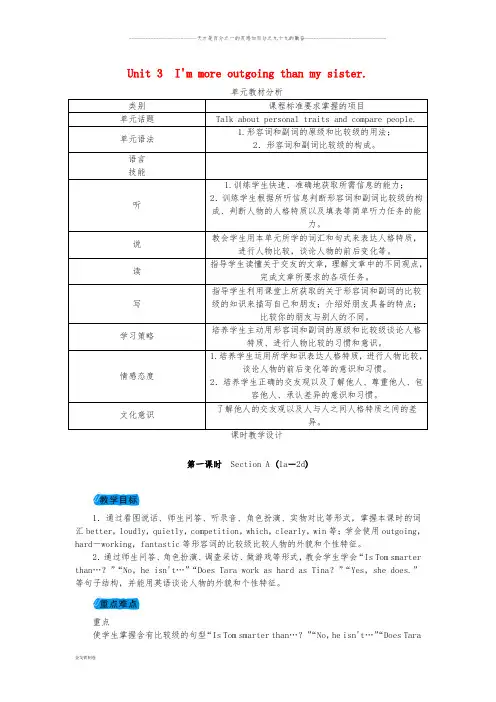
Unit 3 I'm more outgoing than my sister.类别课程标准要求掌握的项目单元话题Talk about personal traits and compare people.单元语法1.形容词和副词的原级和比较级的用法;2.形容词和副词比较级的构成。
语言技能听1.训练学生快速、准确地获取所需信息的能力;2.训练学生根据所听信息判断形容词和副词比较级的构成、判断人物的人格特质以及填表等简单听力任务的能力。
说教会学生用本单元所学的词汇和句式来表达人格特质,进行人物比较,谈论人物的前后变化等。
读指导学生读懂关于交友的文章,理解文章中的不同观点,完成文章所要求的各项任务。
写指导学生利用课堂上所获取的关于形容词和副词的比较级的知识来描写自己和朋友;介绍好朋友具备的特点;比较你的朋友与别人的不同。
学习策略培养学生主动用形容词和副词的原级和比较级谈论人格特质、进行人物比较的习惯和意识。
情感态度1.培养学生运用所学知识表达人格特质,进行人物比较,谈论人物的前后变化等的意识和习惯。
2.培养学生正确的交友观以及了解他人、尊重他人、包容他人、承认差异的意识和习惯。
文化意识了解他人的交友观以及人与人之间人格特质之间的差异。
课时教学设计第一课时Section A (1a-2d)1.通过看图说话、师生问答、听录音、角色扮演、实物对比等形式,掌握本课时的词汇better,loudly,quietly,competition,which,clearly,win等;学会使用outgoing,hard-working,fantastic等形容词的比较级比较人物的外貌和个性特征。
2.通过师生问答、角色扮演、调查采访、做游戏等形式,教会学生学会“Is Tom smarter than…?”“No,he isn't…”“Does Tara work as hard as Tina?”“Yes,she does.”等句子结构,并能用英语谈论人物的外貌和个性特征。
人教版八年级英语上册Unit3教案(表格式三维目标)1.Ask Ss to look at the pictures in 1a and describe the two girls.2.Introduce the new words and phrases to Ss: outgoing。
better。
loudly。
quietly。
hard-working。
XXX。
fantastic。
which。
clearly。
win.3.Explain the grammar point of comparative forms of adjectives and adverbs。
and give examples: XXX.Ⅱ。
Practice1.Ask Ss to work in pairs and make comparisons XXX have learned.2.Play the recording of 1b and ask Ss to fill in the blanks with the XXX.3.Have Ss do the exercise in 1c。
XXX.Ⅲ。
n1.Ask Ss to work in pairs and create their own XXX.2.Have some pairs share their XXX.3.Play the game in 2d。
where Ss have to guess which person their XXX.Ⅳ。
Homework1.XXX.2.Write a paragraph comparing two people。
using the comparative forms of adjectives and adverbs.Ask students to match the words with the correct column.After that。
Go for it 8A Unit 3What are you doing for vacation?教案一、教学内容分析本单元是Go for it八年级上册中第三单元“What are you doing for vacation?”。
本单元的核心话题是谈论未来计划,课文始终围绕这一主题展开,我们要学习如何谈论假期的计划(Vacation plans),及对将来的安排(Future plans)。
让学生学会用what询问将要干什么并回答;用when, who, where, how long, how等词围绕未来计划进行提问和回答。
语言知识和语言技能部分主要是围绕核心话题时设计安排了许多听,说,读,写的任务活动,来不断丰富巩固这一话题的词汇及习惯短语。
我将灵活运用这些活动,并将其中的一些活动进行变化或整合。
二、教学目标分析根据《英语课程标准》关于总目标的具体描述,结合第三单元的教材内容,我按语言知识、语言技能、学习策略、情感态度、文化意识五个方面将本单元的教学目标细化:1、语言知识1.语音:在日常生活中做到语音、语调基本正确、自然、流畅。
2.词汇:(见教参)3.语法:①现在进行时表示将来用法及去做某事的go doing②用what, when, where, who 等对句中的事件、时间、地点、人物等提问。
4.功能: 谈论未来的计划安排5.话题: 熟悉有关度假的内容。
2、语言技能1.能听懂本单元学习活动中的问题,做出较得体的回答。
2.掌握有关假期生活的动词且能熟练运用;掌握wh-特殊疑问句的运用。
运用所学词汇询问和表达未来打算,学会使用现在进行时态表示未来计划;4.能围绕未来计划这一话题作较具体的描述。
5.能读懂介绍未来打算的文章和日程安排。
6.学会书写即将发生的假期安排或计划和科学安排自己的假期活动.3、情感态度1.运用所学语言,积极投身到实践活动中去,实践自己的价值。
2.能在描述自己的计划和打算时,激起学生更加热爱祖国的美好河山和地球,从而为人类的美好明天贡献自己的一份力量。
Unit 3 I’m more outgoing than my sister.Section A 1 (1a-2d)一、教学目标:1. 语言知识目标:1) 能掌握以下单词:outgoing, better, loudly, quietly, hard-working, competition, fantastic, which, clearly, win能掌握以下句型:① Tina is taller than Tara.② Sam has longer hair than Tom.③ She also sings more loudly than Tara.2) 能掌握以下语法:①形容词或副词比较级形式的构成。
②表示两者进行比较的句式结构。
2. 情感态度价值观目标:能对人物的外表进行描绘,个性进行比较。
二、教学重难点1. 教学重点:1) 形容词或副词比较级形式的构成。
2) 表示两者进行比较的句式结构。
2. 教学难点:He has shorter hair than Sam.Is Tom smarter than Tim?She also sings more loudly than Tara.三、教学过程Ⅰ. Lead-in1. Ask Ss to write down as many adj. about people as possible. Check the adj. Ss write and we can group them into some pairs, like: [Section A 1a]tall --- short; thin --- heavy, long hair --- short hair, calm --- wild …Give Ss an example by comparing Old Henry and Santa Claus.e.g. Santa Claus is older than Henry. Henry is taller than Santa Claus.Henry is younger than Santa Claus. Santa Claus is younger than Henry.Ⅱ. PresentationAsk Ss to see the pix about apples and pears to see the differences. Then compare some of their things with each other.e.g. The apples are bigger than the pears.The pears are more delicious than the apples.Summarize the Comparatives. Group competition.A + be(V) + 比较级 + than + B.Ⅲ. Game (I and my desk mate)Ask Ss to compare with their partners and find out the differences.e.g. She is heavier than me. I am more outgoing than her.She gets up earlier than me. I run faster than her.Ⅳ. ListeningThen listen to the recording. Ask Ss to number the twins.Check the answers.Ⅴ. Pair workPoint out the sample conversation in activity 1c.Say, now work with a partner. Make your own conversation about the twins.Ask several pairs to say one or more of their conversations.Ⅵ. Listening1. Work on 2a:Point out the two columns and read the headings: -er, -ier and more. Then point out the words in the box. Read them.Say, now listen and write the –er and –ier words in the first column and the words that use more in the second column.Play the recording and check the answers.2. Work on 2b.Point out the picture and the two boxes with the headings Tina is and Tara is. Say, listen to the recording. Write word in the boxes. The words are from the list in activity 2a.Play the recording and check the answers.Ⅶ. Pair work1. Point out the chart in activity 2c. Say, Make your own conversations according to the information. Ask pairs to continue on their own.2. Ss practice their conversations.3. Ask some pairs to act out their conversations.Ⅷ. Role-play1. Read the conversation first and try to match the people with the right things.a. sang betterb. with shorter hairc. practice more and really wanted to wind. sang more clearlye. danced better2. Let Ss read the conversations after the teacher.3. Let Ss practice the conversation.4. Then let some pairs act out their conversations in front of the class. Homework:Write six sentences:Write about the things that are the same and different between you and your best friend.板书设计:Section A 2 (Grammar focus-3c)一、教学目标:1. 语言知识目标:1) 复习巩固形容词的比较形式及对两者进行对比。
Unit3 SectionB(2a-2e)教案【教材版本与册数】新目标人教版八年级上册【单元名称】Unit3 I’m more outgoing than my sister.【课时】Section B 2a-2e (第4课时)【课型】Reading(阅读课)教材分析本课时内容人教社新目标初中英语教材8上Unit 3 ,该单元话题是“Personal traits”, 功能是“Talk about personal traits and compare people”,此节课型定位为以话题为核心的“阅读课型”,以“a good friend should be like this”为主题,读前准备描述人物性格特征的形容词,并运用此类词汇来描述“My best friend is ……”引入话题,通过各个教学活动,在语言技能上,让学生找出语篇中提到的三对好朋友之间的异同,了解语段,最后通过读后的语篇信息处理及综合性写作练习及拓展课外练习等活动让学生在实际运用中掌握本课时重点知识并形成语篇结构意识。
在策略上,引导学生找出文中好词、好句等,如A good friend is like a mirror. Friends are like books. My best friend helps to bring out the best in me.等,并发现both, as … as 等结构的用法,进行句型操练,语段练习。
在情感态度上,分析语篇,思考自己的择友标准,培养学生综合思考能力和辩证思维,运用所学知识,正确表达个人喜好及意愿。
语言知识目标:1. 通过预热活动和与师生、生生互动的问答形式,学习和巩固该话题下的词汇句型,激发调动学生的求知欲,熟练使用以下词汇、短语和句型:1 / 8第 1 页教学目标mirror, kid, as long as, necessary, be different from, bring out, grade, should, the same as, reach, hand, touch, heart, fact, in fact, break, arm, share, loud, similar, be similar to-- Should friends be the same of different?-- It’s not necessary to be the same./ I don’t really care if my friends are the same as me or different….But I think friends are like books –you don’t need a lot of them as long as they’re good.We both like sports, but he plays tennis better, so he always wins. However, Larry often helps to bring out the best in me.A true friend reaches for your hand and touches your heart.学习策略:2. 通过读前词汇运用造句,运用所学的语句或固定表达方式表述自己的交友观点,For me, a good friend …….I think friends…I don’t care if my friends…That’s not very important for me.3. 通过读中的分段任务,填表,问题及思维导图的任务性设计,让学生熟练运用所学表述人物个性特征及行为习惯的形容词和副词描述朋友及他人并能理解获取文本有效信息。
Unit 3I'm more outgoing than my sister.Section A是基本的语言部分,打好本单元目标语言的基础。
运用听力(1b,2a,2b)、pair-work(1c,2c)、role-play (2d)等口语练习活动,层层递进,步步深入,充分培养学生学习目标英语的语感。
目标语言(语法和词汇)是在每个单元的开始通过图片和对话框呈现的。
图片将帮助学生建立一个自然的语境,让学生清晰地理解新的语言目标,熟悉这些语言在日常生活中是怎样使用的。
Section B是比较级的拓展和综合的语言运用。
1a,1b通过讨论在朋友身上什么是最重要的,为后面提供基本句子如makes me laugh等。
1c,1d通过听力继续以朋友为话题以比较级为语法谈论朋友。
2b,3c是通过阅读和写作最后达到综合运用语言的目的,2b培养真实生活中的语言阅读技能。
4通过谈论谁是合适的student helper来继续巩固运用目标语言。
Self Check 2考查五个形容词的用法及区别形容词比较级与原级的使用。
Self Check 3运用比较级对比自己和好友。
第一课时Section A(1a-2d)Teaching Goals【教学目标】Key words:outgoing,better,loudly,quietly,hard-working,competition,fantastic,which,clearly,winKey phrases:play the drums,more...than,as...as,singing competition,have funKey sentences:1. I'm more outgoing than my sister.2. That's Tara,isn't it?No,it isn't.3. I think she sang more clearly than Nelly.Teaching Key Points【教学重点】The vocabulary:outgoing,better,loudly,quietly,hard-working,competition,fantastic,which,clearly,win,more...than,as...asTarget language:—Is that Sam?—No,that's Tom. Sam has longer hair than Tom.—That's Tara,isn't it?—No,it isn't. It's Tina. Tina is taller than Tara. And she also sings more loudly than Tara.—Did you like the singing competition yesterday,Anna?—Oh,it was fantastic!Nelly sang so well!Is Tom smarter than Sam?Teaching Difficult Points【教学难点】Oral practice using the target language above.Teaching Aids【教学工具】An English textbook,a tape recorder,CAI or courseware.Teaching Steps【教学过程】★Step 1Leading inAsk a student to introduce herself/himself.★Step 2Pre-taskPage 17,1a.1.Show some pictures to Ss.Say,They are stars. Ask Ss to tell what they see.Ask Ss to use the words:tall,loudly,thin,long hair,short hair,heavy,quietly,short and so on.2.Then ask Ss to repeat these sentences:Yao Ming is taller than Ronaldo.★Step 3While-taskPage 17,1c & 1b.1.Call attention to the picture.2.Point out the sample conversation in Activity 1c.Say,Now work with a partner. Make your own conversation about the twins.3.Ask several pairs to say one or more of their conversations.4.Then listen to the recording. Ask Ss to number the twins.5.Check the answers.Page 18,2a.1.Point out the two columns and read the headings:-er,-ier and more. Then point out the words in the box. Read.Say,Now listen and write the“-er”and“-ier”words in the first column and the words that use “more” in the second column.2.Play the recording and check the answers.Page 18,2b.1.Point out the picture and the two boxes with the headings Tina and Tara.Say,Listen to the recording. Write sentences in the boxes.2.Play the recording and check the answers.★Step 4Post-taskPage 18,2c & 2d.1.Point out the chart in Activity 2c and on Page 81.Say,Make your own conversations according to the information. Ask pairs to continue on their own.2.Correct the answers.3.Make students scan the conversation in 2d.4.Teach and then make Ss role-play the conversation in pairs. In this part,student A will be Julie. Student B will be Anna. As they talk,move around to monitor their work. Offer language or pronunciation support as needed.5.Have a group of students present their conversation to the class.★Step 5Homework1.How are you and your sister/brother different?Write down.2.Do the exercises on Page 15 in students' book.Board Design板书设计Unit 3I'm more outgoing than my sister.The first period Section A(1a-2d)1.Words:outgoing,better,loudly,quietly,hard-working,competition,fantastic,which,win,clearly2.Target language:①A:That's Tara,isn't it?B:No,it isn't.②A:Is Tom smarter than Sam?B:No,he isn't. Sam is smarter than Tom.第二课时Section A(GF-3c)Teaching Goals【教学目标】Key sentences:1.Is Tara more outgoing than Tina?No,she isn't. Tina is more outgoing than Tara.2.Does Tara work as hard as Tina?Yes,she does.3.Who is smarter,your mother or your father?I think my mother is smarter than my father.Teaching Key Points【教学重点】1.Grammar Focus. The sentences in the box.2.The comparative forms of adjectives and adverbs.Teaching Difficult Points【教学难点】1.The comparative forms of adjectives and adverbs.2.Use some adjectives to describe people and use their comparative forms to compare people.Teaching Aids【教学工具】An English textbook,CAI or courseware.Teaching Steps【教学过程】★Step 1Leading inAsk,How are you and your mother/father different?Ask some Ss to answer.★Step 2Pre-taskPage 19,Grammar Focus.1.Review the grammar box. Ask Ss to read the sentences to the class.2.Write the phrases “more outgoing than”.Say,When you compare things using words with three or more syllables,you use the word “more”.3.Call attention to the word “friendly”,circle “y” and say,When a word ends in “y”,change “y” to an “i” and add“-er”.4.Practice reading the sentences in the chart.★Step 3While-taskPage 19,3a & 3b.1.Call students' attention to 3a.2.Make students complete the tasks individually.3.Choose Ss to give their answers.4.Correct the answers.5.Practice reading.6.Turn to 3b.And choose a student to answer the five questions according to the example.★Step 4Post-taskPage 19,3c.1.Ask students to read the sample conversation in the box.2.Have students work in pairs to complete the chart.3.Ask some pairs to present their dialogues.★Step 5Homework1.Compare one of your best friends with you. Write down the same and different things between you two.2.Do the exercises on Page 16 in students' book.Board Design板书设计Unit 3I'm more outgoing than my sister.The second period Section A(GF-3c)1.Target language:①A:Is Tara more outgoing than Tina?B:No,she isn't. Tina is more outgoing than Tara.②A:Are you as friendly as your sister?B:No,I'm not. I'm friendlier.③A:Does Tara work as hard as Tina?B:Yes,she does.④A:Who is smarter,your mother or your father?B:I think my mother is smarter than my father.2.Answers to 3a.第三课时Section B(1a-1e)Teaching Goals【教学目标】Key words & phrases:talented,truly,care,be talented in,the same as,be good at,care about,make sb. laughKey sentences:1.I think a good friend makes me laugh.2.Molly studies harder than her best friend.Teaching Key Points【教学重点】The vocabulary:talented,care,care about,be talented inTarget language:I think a good friend makes me laugh.For me,a good friend likes to do the same things as me.Yes,and a good friend is talented in music,too.That's not very important for me...Molly studies harder than her best friend.Well,Mary and her best friend are both tall.Teaching Difficult Points【教学难点】Use the target language to talk with your classmates about your opinions on what makes a good friend.Teaching Aids【教学工具】An English textbook,a tape recorder,CAI or courseware.Teaching Steps【教学过程】★Step 1Leading in1.Show a maxim to Ss:A friend in need is a friend indeed.2.Ask,What kinds of things are important in a friend?★Step 2Pre-taskPage 20,1a.1.Read each description to the class and ask the Ss to repeat.2.What kinds of things are important in a friend?Rank the things below 1—7(1 is the most important).3.Ask different Ss to copy the seven phrases on the board. Then read the phrases together.★Step 3While-taskPage 20,1b.1.Say,Now make your own statements about friends using the phrases inActivity 1a.2.Ask some Ss to tell the class what they look for in a friend. And say,Who is your best friend?Page 20,1c.Play the recording and check the answers.Page 20,1d.Play the recording and check the answers.★Step 4Post-taskPage 20,1e.1.Say,Now work with your partner. Make a conversation using information in the chart.2.Ask several pairs to say their conversations to the class.★Step 5HomeworkDo the exercises on Page 17 in students' book.Board Design板书设计Unit 3I'm more outgoing than my sister.The third period Section B(1a-1e)1.Key vocabulary:truly,be talented in,the same as,be good at,care about,make sb. laugh2.Target language:A:Molly studies harder than her best friend.B:Well,Mary and her best friend are both tall.第四课时Section B(2a-2e)Teaching Goals【教学目标】Key words:serious,mirror,kid,necessary,both,though,grade,should,saying,reach,hand,touch,heart,fact,break,arm,laugh,share,loud,similar Key phrases:as long as,be different from,bring out,the same as,care about,in fact,be similar toKey sentences:2.I don't really care if my friends are the same as me or different.3.Huang Lei isn't as good at tennis as Larry.4.A true friend reaches for your hand and touches your heart.Teaching Key Points【教学重点】The vocabulary:serious,necessary,both,though,should,reach,touch,break,laugh,share,loud,similar,as long as,be different from,the same as,in fact,be similar toTarget language:I like reading books and study harder in class.In fact,she's funnier than anyone I know.I know she cares about me because she's always there to listen.Teaching Difficult Points【教学难点】Talk about the famous sayings about friends.Teaching Aids【教学工具】An English textbook,CAI or courseware.Teaching Steps【教学过程】★Step 1Leading in1.Greetings.2.Ask,Should friends be the same or different?Choose 2 or 3 students to talk about their opinions. Say,Today we'll read about what these people think.★Step 2Pre-taskPage 21,2a & 2b.1.Project some famous sayings about friendship on the screen. Ask Ss to guess their meanings and think of more.2.Project these new words on the screen or write them on the board and teach the new words. Ask students to repeat them. And make sure everyone knows the meanings.serious adj.严肃的;mirror n.镜子;necessary adj.必需的;both adj. & pron.两个;though adv.不过,可是conj.虽然;should modal v.应该;reach v.到达;touch v.感动,触摸;fact n.事实;break v.(使)破;laugh v.笑;share v.分享;similar adj.类似的;as long as只要;be different from 与……不同;bring out 使显现;the same as和……相同;in fact事实上;be similar to与……相像的3.Make students scan the three articles first. Ask students to put a mark in contents that are unfamiliar to them. Then the teacher lead Ss to learn them. Pay attention to the new words and phrases on the screen.4.Practice reading.★Step 3While-taskPage 22,2c & 2d.1.Make students read 2b again. Then judge if the eight statements in 2c are true(T)or false(F).2.Choose students to give their answers.3.Check the answers.4.Ask,How do you and your friends compare with the people in the article?Choose a student to talk about it with five sentences.★Step 4Post-taskPage 22,2e.1.Read the four sayings about friends.2.Talk about these questions with your partner:Which saying about friends is your favorite?Which friend do you think about when you read this saying?Why?Begin your statements according to the example:My favorite saying is...It makes me think about my best friend. She/He is...★Step 5Homework1.Search for five famous sayings about friends. Write them in your exercise books.2.Do the exercises on Page 18 in students' book.Board Design板书设计Unit 3I'm more outgoing than my sister.The fourth period Section B(2a-2e)1.Words:serious,mirror,necessary,both,grade,should,saying,reach,hand,touch,fact,break,laugh,share,loud,similar2.Phrases:as long as,be different from,bring out,the same as,care about,in fact,be similar to3.Sentences:①I'm quieter and more serious than most kids.②Huang Lei isn't as good at tennis as Larry.③Friends are like books-you don't need a lot of them as long as they're good.④A true friend reaches for your hand and touches your heart.第五课时Section B(3a-Self Check)Teaching Goals【教学目标】Key words & phrases:primary,information,primary school,be good with,call sb. at,have good gradesKey sentences:1.The English Study Center needs a weekend student helper for primary school students.2.Call the English Study Center at 443-5667 for more information.3.So who do you think should get the job,Jenny or Jill?Teaching Key Points【教学重点】The vocabulary:information,primary school,have good grades,be good with,call sb. at...Teaching Difficult Points【教学难点】Writing practice.Teaching Aids【教学工具】An English textbook,CAI or courseware.Teaching Steps【教学过程】★Step 1Leading in1.Greetings.2.Check the homework.★Step 2Pre-taskPage 23,3a.1.Look at the pictures and the information in the chart.2.Compare Wang Lingling with Liu Lili. Write down the results.3.Choose a student to present his or her answers.★Step 3While-taskPage 23,3b & 3c.1.Complete the task in 3b.2.Write two paragraphs describing your friends using the notes you make in 3b.3.Choose 2 or 3 students to read their competitions loudly.4.Correct the mistakes.★Step 4Post-taskPage 24,Part 4.1.Write the names of two outgoing students on the board. Say,Who do you think should get the job,A or B?2.Ask Ss to work in pairs.3.Ask some pairs who they think should get the job and why.★Step 5ExercisePage 24,Self Check.1.Ask students to work on their own.2.Check the answers.★Step 6Homework1.Compare two of your best friends. Write five sentences using comparatives.2.Do the exercises on Page 19 in students' book.Board Design板书设计Unit 3I'm more outgoing than my sister.The fifth period Section B(3a-Self Check)1.Key vocabulary:information,primary school,be good with,call sb. at+电话号码,have good grades2.Sentences:①Call the English Study Center at 443-5667 for more information.②Jenny is smarter,but I think Jill is more outgoing.。
Unit 3 What are you doing for vacationPeriod one●教学内容与分析❶教学内容:Section A 1a/1b/1c /2c SectionB1a/1b/4❷教学目标:a.掌握新单词:babysit, camp, bike, ride, sightseeingb.掌握新句型:what are you doing for vacation?/ I‟m visiting my cousin‟s house.What‟s she doing? She‟s going camping./ What are they doing? They‟re going fishing.c. learn to talk about future plans.●教学重点、难点分析:❶教学重点:present progressive as future❷教学难点:where what questions.●课前准备❶教师准备教学课件。
❷教师准备磁带和录音机。
●教师设计教学步骤建议和说明Step 1 lead-inWhat are you doing for vacation?T: Let‟s sing a song “what are you doing?”(show flash card) 激发学生兴趣,让每一个学生都动起来。
Step 2 Revision(pairwork)Revise something about vacation then ask: Where did you go on vacation? How was your vacation?Let‟s practice their vacation. 复习一下有关vacation的内容。
Step 3 Brain stormCollect the names of activities which said by students. 通过竞赛让学生说出尽可能多的活动。
T: Let‟s have a competition?Which group can give the most vacation activities?Then show three pictures about go to park/yellow mountain /Tian‟anmen Square.Step 4 Lead-inShow students a big calendar and say:T: Today is Friday, Tomorrow is Saturday, I‟m staying at home on Saturday. And I am relaxing at home on Sunday. (Teach new words: camp and babysit) then ask students:T: what are you doing on Saturday and Sunday?S: I‟m babysitting.Show some pictures and ask:What are you doing?What are they doing?What is he/she doing? 通过一张日历引出今天的主题。
Step 5 PracticeNow, Let‟s work in pairs practice What is he/she doing?What are you/they doing? 不断反复操练,巩固句型。
Step 6 Presentation○1finish section A la, look at the vacation activities in the picture. Make a list and add some more then check the answer.○2finish section A 1b. listen to the conversations and number the pictures (1-3).Step 7 GuessingT: Now, Let‟s play games. I will show you some pictures and you guess.What am I doing? 学生对猜游戏都比较感兴趣,让他们都来动动脑吧。
Step 8 SurveyLet‟s boast (吹牛皮)1.If you go tripping, What are you doing for vacation?2.If you go tripping, What shall we take?3.If you go tripping, Where are you going?When are you going?Who are you going?How long are you staying? Discuss in groups and make a vacation plan?Then give a report. 尽情地吹吧,吹得越多越好。
这部分训练学生的口语表达能力。
Step 9 Home workWrite an e-mail to tell you pen pal about your groups‟vacation plan or write a conversation about telling your friend your vacation plan.课后记:Period Two●教学内容与分析❶教学内容:Section A 2a/2b/SectionB2a/2b/ 2c /Selfcheck2❷教学目标:a. To master the new words: plan、Tibet、go hiking 、go away 、get back 、postcard 、sendb. To master the sentences:What‟s she/he doing for vacation?When is she/he going?Who is she/he going with?How long is she/he staying?c. Learn to talk about future plans.●教学重点、难点分析:1、Master the new words and the useful expressions.2、Present progressive as future.●课前准备❶教师准备教学课件。
❷教师准备课文中的有关的表格。
❸教师准备磁带和录音机。
●教师设计教学步骤建议和说明Step 1 Revision and lead-inLet Ss guess what I am doing for vacation?Ask: What are you doing for vacation?According to the students‟answers, the teacher can go on asking: That sounds interesting /exciting. Who are you going with?When are you going? 这部分是对第一课时重点句型进行必要的复习巩固,同时自然地引出另外两个新句型who和when。
教师在导入过程中应注意难度的逐步加深。
Step 2 PairworkHave Ss work in pairs to make up short dialogues. Try to use the three questions:What are you doing for vacation?Who are you going with?When are you going?Then choose some of them to act.Ask the other Students to write down some information about the dialogues. 通过这个练习让学生初步熟悉由who和when提出的新问题。
同时为了让学生的对话表演所引起更多同学的关注,有意识地要求学生记录相关信息,为下一个memory game 作铺垫。
Steps 3 Memory gameAfter some students act out their dialogues. Have Ss play a game.The teacher can ask three questions:What is XX doing for vacation?Who is XX going with?When is XX going?Let Ss use she‟s or He‟s to answer. If the student can answer the most questions,She/He can get a present. 这个游戏可以检测学生在第二步中听的情况,又可活跃课堂气氛,更主要的是操练了第三人称疑问句的答句。
Step 4 ListeningPlay the tape twice. Let Ss finish 2a and 2b. Then check the answers together.. 这一练习是为了进一步巩固上面的三个新句型,同时为学生汇报他人的假期计划做准备。
Step 5 Group workSay: I think you want to know more about the other students‟ vacation plans. Now I want you to go anywhere in class to ask anyone about their vacation 这一练习主要是让学生通过调查汇报的活动,不但从口头上,也从笔头上plans. You can use what who when Then fill in the form.After they finish, the teacher can ask them to read the reports to theirpartners. Then choose some of them to give reports in class. Ask everystudent to listen to the reports carefully.操练新句型。
Step 6 Presentation.Say: Now I want to know who listens to the reports the most carefully and remembers the most. I want to ask some questions about the reports:1、Ask one of them:1)Do you know XX‟s vacation plan?2)Is she going to Tibet? San Francisco/Hong Kong/Hawaii3)What is she doing for vacation?4)Is she going hiking there?5)What is she doing there?6)Who is she going with?7)When is she going?8)How long is she staying?When the teacher asks these questions, he should teach Ss the new words. Then if the student can‟t answer the last question, the teacher should help to ask XX himself and help XX to answer: I‟m staying there for XX days. At last the teacher can go on asking XX :Do you like going away for a long time?Can you send me a postcard from XX and show me your photos when you get back to school?The teacher should teach students the new words, too.2. Ask more students these questions .Help them to understand the new words. 这部分除了引出新句型How long 以外,还着重针对3a部分中的新单词、词组作了铺垫,引出这些词汇并逐一教援,为下一部分填表作铺垫。